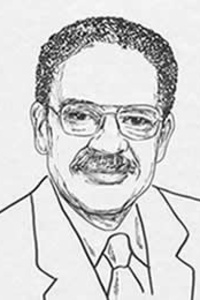Celebrating Black Engineers: Philip G. Hubbard
Honor Wall Biography
 Philip G. Hubbard
Philip G. Hubbard
Research Engineer, Iowa Institute of Hydraulic Research (1954 – 1966)
Professor of Mechanics and Hydraulics (1954 – 1991)
UI Dean of Academic Affairs (1966 – 1971)
UI Vice President for Student Services (1971 – 1990)
Founder and Director of Opportunity at Iowa (1987 – 1990)
Phil Hubbard’s life and career advanced the university for half a century. After receiving UI bachelor (Electrical Engineering), M.S. and Ph.D. (Mechanics and Hydraulics) degrees, he climbed academic ranks to professor. At IIHR, he developed innovative instrumentation and fluids data-acquisition techniques. Stepping into university administration, Hubbard led UI toward racial equality, thus reshaping its future. Praised for his mental agility and for being the first African-American in several administrative positions, including the first vice president in a Big Ten university, he is perhaps better remembered for his fine human qualities: his strong but kindly manner, and the patience, persistence, and leadership that he demonstrated as counsel to six UI presidents.
My Iowa Journey by Philip G. Hubbard
-
Philip Hubbard's life story begins in 1921 in Macon, a county seat in the Bible Belt of north central Missouri, whose history as a former slave state permeated the culture of his childhood. When he was four his mother moved her family 140 miles north to Des Moines in search of the greater educational opportunity that Iowa offered African American students. In this recounting of the effects of that journey on the rest of his life, Phil Hubbard merges his private and public life and career into an affectionate, powerful, and important story.
Hubbard graduated from the University of Iowa with a degree in electrical engineering in 1946 by 1954 he had received his Ph.D. in hydraulics. The College of Engineering extended a warm academic welcome, but nonacademic matters were totally different: Hubbard was ineligible for the housing and other amenities offered to white students. Intelligent, patient, keenly aware of discrimination yet willing to work from within the university system, he advanced from student to teacher to administrator, retiring in 1991 after decades of leadership in the classroom and the conference room.
Hubbard's major accomplishments included policies that focused on human rights these policies transformed the makeup of students, faculty, and staff by seeking to eliminate discrimination based on race, religion, or other nonacademic factors and by substituting affirmative action for the traditional old-boy methods of selecting faculty and administrators. At the same time that he was advancing the cause of human rights and cultural diversity in education, his family was growing and thriving, and his descriptions of home life reveal one source of his strength and inspiration.
The decades that Hubbard covers were vital in the evolution of the nation and its educational institutions. His dedication to the agenda of public higher education has always been matched by his sensitivity to the negative effects of discrimination and his gentle perseverance toward his goals of inclusion, acceptance, and fairness. His vivid personal and institutional story will prove valuable at this critical juncture in America's racial history.
-
Phillip G. Hubbard reading, Live From Prairie Lights, June 18, 1999Philip G. Hubbard reads from his memoir, My Iowa Journey: The Life Story of the University of Iowa's First Tenured African-American Tenured Professor.
Live From Prairie Lights was a live public radio program broadcast from Prairie Lights, an independent bookstore in Iowa City, Iowa.
Tell Me Your Story from Iowa City Public Library
Tell Me Your Story is a series of biographical interviews of people who have impacted the Iowa City community with their contributions.
 Philip G. Hubbard
Philip G. Hubbard